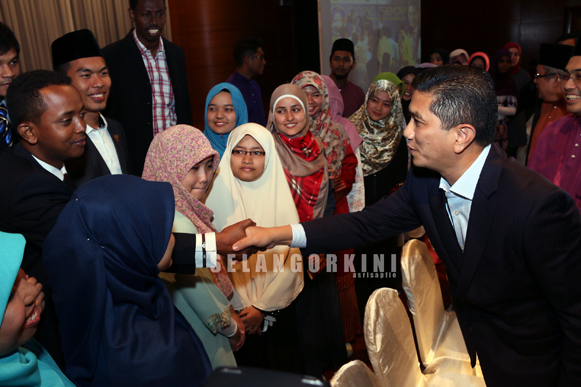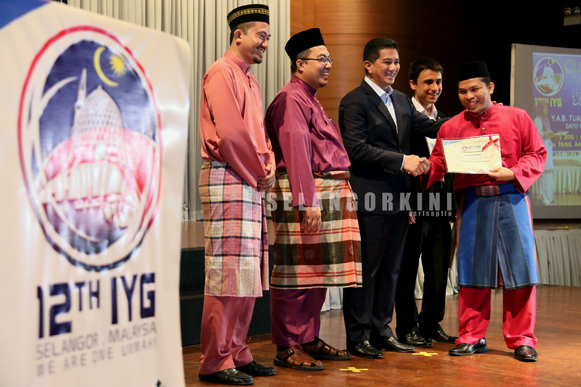Introduction
The Muslim world today is undergoing major challenges that collectively exert severe strain on the umma. In the 20th century, the most glaring plight of the umma centred on the state of its human development. In the 21st century, the plight remains but the condition of the umma is made even worse with developments in the political sphere.
Human development
Let me first touch briefly on the question of human development because it is crucial for a meaningful discourse on Islam and the challenges faced by our youth on a global scale.
In both senses of the concept of human development, the umma is faring poorly. In the narrow sense, the Muslim world registers among the lowest in terms of per capita GNP, life expectancy and literacy while in the broader sense, we are at the bottom in terms of freedom and democracy – in such basic things as universal enfranchisement in free and fair elections, governance and fundamental liberties. There are exceptions of course but these are few and far between.
 According to Nobel laureate Amartya Sen, development should be seen as a process of expanding freedoms and must necessitate the removal of poverty, tyranny, lack of economic opportunities, social deprivation and the machinery of repression.
According to Nobel laureate Amartya Sen, development should be seen as a process of expanding freedoms and must necessitate the removal of poverty, tyranny, lack of economic opportunities, social deprivation and the machinery of repression.
In this regard, the Muslim world is definitely in dire need of such development.
Facing key challenges in the 21st century
And as we moved into the 21st century, even as our socio-economic condition remains unresolved, the umma is faced with a new dimension of threats and challenges dominated by violence, extremism and bloodshed.
We consider this a ‘new dimension’ not because it is something that is completely new but the magnitude, intensity and frequency is on a level yet unseen.
Extremism and militant jihadism
Today, we are witnessing radical and extremist groups committing acts of depravity on an unprecedented scale and intensity – butchering hostages in public executions, raping women, kidnapping hundreds of school girls and massacring hundreds of children even as they are peacefully attending school. This is all done in the name of Islam.
Indeed, we know this is not Islam no matter how persistent these murderers continue to attempt to justify their barbaric killings. Islam is rahmatan lil ‘Alamin.
ISIS, the Taliban, Boko Haram, al-Shabab and so on – these are the scourge of mankind – and to associate them with Islam and the umma is an injustice to us all. Indeed, they betray Islam and the umma.
Even way before the ISIS headline grabbing notoriety for public executions, we have also seen in Southeast Asia the atrocities committed by terrorist Islamist groups in the region.
For example, since the early 1990s, the Abu Sayyaf Group in the Philippines has carried out bombings, assassinations, kidnappings and extortion in their fight for an independent Islamic state.
Similarly, the 2005 Bali bombings and related series of bombings in Indonesia said to be linked to Jemaah Islamiah were nothing but a manifestation of how misguided radicalism in religion can translate into sheer barbarism.
And just yesterday, we heard about how the ISIS captors of the Jordanian pilot burned him alive – there is just no language strong enough to condemn this kind of brutality and inhumanity.
Targeting youth
But we cannot just dismiss these groups for they continue to pose a very serious threat to the world. And even more dangerous is their focus on targeting the youth to join their ranks.
When one considers that half the population in the Muslim world are in their early twenties or even younger, the enormity of the problems should become obvious. With social networks working ever so efficiently, the sense of insufficiency and deprivation is quickly multiplied and spread.
How do we deal with this threat?
To make sense of the theme of Islam Rahmatan lil Alamin, one must deal holistically with the key issues of poverty, economic growth, and education apart from the fundamental freedoms.
There are currently in existence quite a number of Muslim or Islamic organizations on a global level. On paper, they purport to serve the needs of the Muslim world one way or the other.
 Unfortunately, when push comes to shove, leaders of the Muslim world have yet to really come together to collectively grapple with the global challenges being faced by the umma.
Unfortunately, when push comes to shove, leaders of the Muslim world have yet to really come together to collectively grapple with the global challenges being faced by the umma.
Not surprisingly, the common problems remain unresolved. These problems carry a common linkage: outmoded educational systems, high unemployment, dismal health care and inadequate housing. Misgovernance and abuse of power stand out like a sore thumb.
The umma’s money is being misused for personal gain apart from wasteful and unproductive projects that do not add long term value for society.
That is why in the state of Selangor, our latest budget is built on the theme of development. The most important part of the strategy is centred on governance – in order to ensure success of this developmental approach, we need full accountability, transparency and total commitment to weed out corrupt practices. This way, leakages will be plugged and the objectives can be fully realised.
Part and parcel of the long term strategy is centred on education. In this regard, the Muslim world is in dire need of educational reform from primary to tertiary level. Without this, socio-economic progress of the umma will not be possible and this again will make it easier for militant jihadism to find its prey.
With education, we foster the opening of minds and the expansion of intellectual activity. This is needed to tackle issues such as Islamophobia, pluralism, multiculturalism, and even liberalism.
Muslim youth must set the example of being open to a healthy and vigorous discourse without any quarters having to be hypersensitive or overly emotional.
The maqasid al-Shari’ah warrants a sincere determination to strive intellectually in order to do justice to the true purport of revelation.
“He gives wisdom to whom He wills, and whoever has been given wisdom has certainly been given much good. And none will remember except those of understanding.” ( Surah al Furqan:32 )
The Muslim youth of today must therefore demonstrate intellectual fortitude, dynamism and maturity in facing up to the various obstacles in their path and by open and rational engagement, overcome them.
I have no doubt that this international gathering has provided you with an ideal forum for the articulation of new ideas and the cross-fertilization of views across the board.
In this regard, the Muslim youth must blaze a trail for the prospective advocacy of islah and tajdid and demonstrate that Islam is indeed rahmatan lil’ Alamin.
Islah and tajdid or reform and renewal – indeed these are not new in our discourse and I am sure that all of you gathered here today are familiar with the concepts.
But we have to ask ourselves: have we truly internalised them or do they merely remain at the level of ideas only?
We know that ideas by themselves are just not good enough – very much like saying that Islam is a blessing to all mankind. People are going to say cynically: what blessing? Look at all the terrible things happening in the Muslim world and the state of our socio-economic development. See all that killing and butchering in the name of jihad?
That of course is the negative side of the equation. To turn it around, the ball is in our court. The Muslim youth of the world can and must internalise islah and tajdid and translate that into wilful change for the better of the umma.
Rule of law, accountability, clean government, freedom and justice – the Muslim world is desperately short on this account. You must provide the impetus and be the driver for change.
Justice and Moderation
This reform and renewal must include placing the Qur’an back to its pristine position with its emphasis on inclusiveness, peaceful co-existence and mutual respect.
Moderation and justice must prevail. Non-Muslims must not be viewed as ‘the other’ and looked at with suspicion. Islam advises us to treat neighbours kindly, even if they are not Muslim.
In Surah al-Mumtahanah, ayah 8 reminds us:
“Allah does not forbid you from those who do not fight you because of religion and do not expel you from your homes – from being righteous toward them and acting justly toward them. Indeed, Allah loves those who act justly.”
In other words, Allah does not forbid you to be kind, uphold ties, return favours and be fair towards non-Muslims.
In surah al-Baqarah: 143, Allah enjoins:
“And thus we have made you a just community that you will be witnesses over the people and the Messenger will be a witness over you.”
Moderation and justice therefore feature in all aspects of Islam. The true Muslim believes in all the Prophets, Messengers, and in all Allah’s revealed Books.
Muslim leaders and a new discourse
For much of the Muslim world, the recurrent problems in the political sphere of human development as I mentioned at the outset, remain unresolved.
Be it secular governments or supposedly Islamic regimes, the Muslim world continues to be enveloped in tyranny, autocratic regimes and governance under corrupt and power hungry leaders.
Malek Bennabi (1905 – 1973) undoubtedly one of the world’s (not just the Muslim world) most renowned thinkers, warned us decades ago about the emergence of “civilizational bankruptcy”.
We can and we must take lessons from the fall of the Almohad dynasty that ruled Muslim Spain and North Africa and how bankruptcy of ideas could spell decay and ruin for even great civilizations.
Muslim leaders must therefore forge a new discourse to spur this much needed reform and renewal. In this discourse, we must set a new narrative not based on a parochial or regional perspective.
It has to be an Islamic world view that is not bound by geo-political considerations or prompted by purely cultural imperatives. In other words, it has to be true to our theme that Islam is indeed a blessing to all – a truly universal perspective.
Kerajaan Negeri Selangor komited untuk membudayakan serta mengembangkan wacana baru demi kemaslahatan umat Islam bukan hanya di Malaysia akan tetapi dirantau ini. Perkembangan ini pastinya akan membuka dimensi baru pemikiran masyarakat ke arah sebuah pemikiran yang lebih progresif demi mencapai matlamat membangun sebuah masyarakat madani.
Namun begitu, harus ada keberanian khususnya daripada kesatuan generasi muda seperti Angkatan Belia Islam Malaysia (ABIM) serta fraksi – fraksi mahasiswa dan Lembaga Swadaya Masyarakat untuk sama – sama terlibat dalam wacana – wacana baru yang lebih universal dan kontemporari.
Tanpa wacana baru dalam pemikiran masyarakat, maka tidak akan muncul anjakan paradigma dalam pemikiran masyarakat yang hanya mengakibatkan pemikiran yang mandom dan terbelenggu dalam hegemoni zaman.
Finally, may I once again commend the main organizers, Angkatan Belia Islam Malaysia (ABIM), the Union Of NGOs Of The Islamic World (UNIW), Wadah Percerdasan Umat (WADAH) and Persatuan Kebangsaan Pelajar Islam Malaysia (PKPIM) for making this conference a success.
This gathering has been a momentous and meaningful event. Resolutions must now be translated into reality and no effort should be spared in continuously working to deal with the global challenges being faced by the umma.
Thank you.